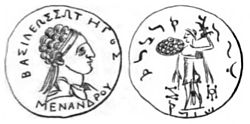Alexandria in the Caucasus
| Alexandria on the Caucasus | |
|---|---|

Menander coin
|
|
 Alexandria in the Caucasus is located to the south of Bactria, in the mountains of the Hindu Kush. |
|
| Country | Paropamisade |
| Founded by | Alexander the Great |
| Population | |
| • Total | 10,000 |
Alexandria in the Caucasus (medieval Kapisa, modern Bagram) was a colony of Alexander the Great (one of many colonies designated with the name Alexandria). He founded the colony at an important junction of communications in the southern foothills of the Hindu Kush mountains, in the country of the Paropamisade.
Alexander populated the city with 7,000 Macedonians, 3,000 mercenaries and thousands of natives (according to Curtius VII.3.23), or some 7,000 natives and 3,000 non-military camp followers and a quantity of Greek mercenaries (Diodorus, XVII.83.2), in March 329 BC. He had also built forts in what is nowadays Bagram in Afghanistan, at the foot of the Hindu Kush, replacing forts erected in much the same place by Persia's king Cyrus the Great c. 500 BC.
The divinity of the city seems to have been Zeus, as suggested by coins of the Greco-Bactrian king Eucratides.
Alexandria of the Caucasus was one of the capitals of the Indo-Greek kings (180 BC-AD 10). During the reign of Menander I the city was recorded as having a thriving Buddhist community, headed by Greek monks. In Buddhist literature, the Greek (Pali: Yona, lit: "Ionian") Buddhist monk Mahadhammarakkhita (Sanskrit: Mahadharmaraksita) is said to have come from “Alasandra” (thought to be Alexandria of the Caucasus), with 30,000 monks for the foundation ceremony of the Maha Thupa ("Great stupa") at Anuradhapura in Sri Lanka:
...
Wikipedia
